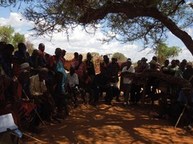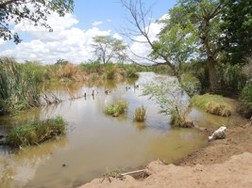
 A water in-take at Pangani river.
A water in-take at Pangani river. KIHO visited the Ruvu area to look for ways to accept a possible project with the UN World Food Program to rehabilitate one water irrigation canal by cementing it. Currently, there are a lot of leakages, which makes the canal quite ineffective. What makes it even more difficult is that the main water intake is broken, and such a reparation might cost too much, at least with the budget that is available. Worst of all, the Maasai community is very much against the project and demand that they also benefit from an irrigation canal that will benefit their cattle. Together with village representatives, KIHO held two public meetings with 30 respectively some 100 people. As of now, we can’t claim that we have really progressed. More dialogue will be necessary to move forward.
 RSS Feed
RSS Feed
